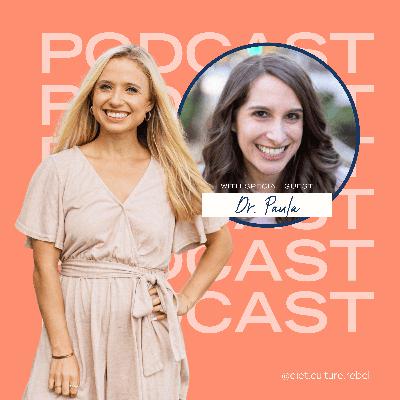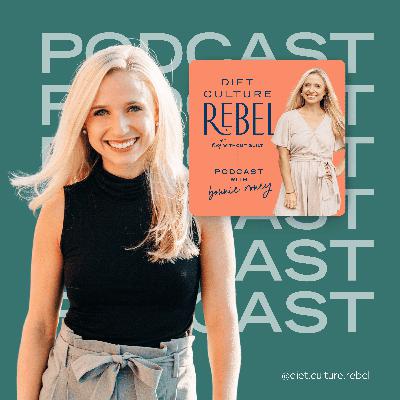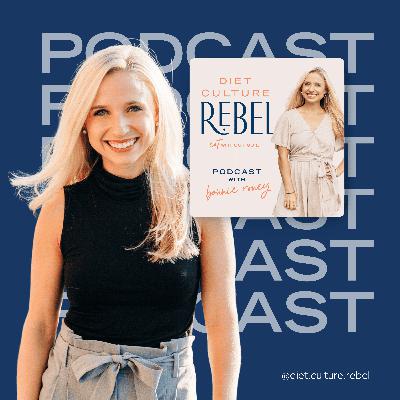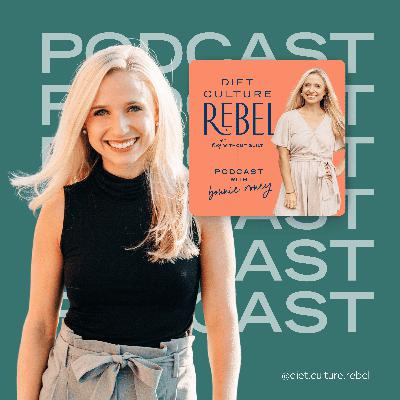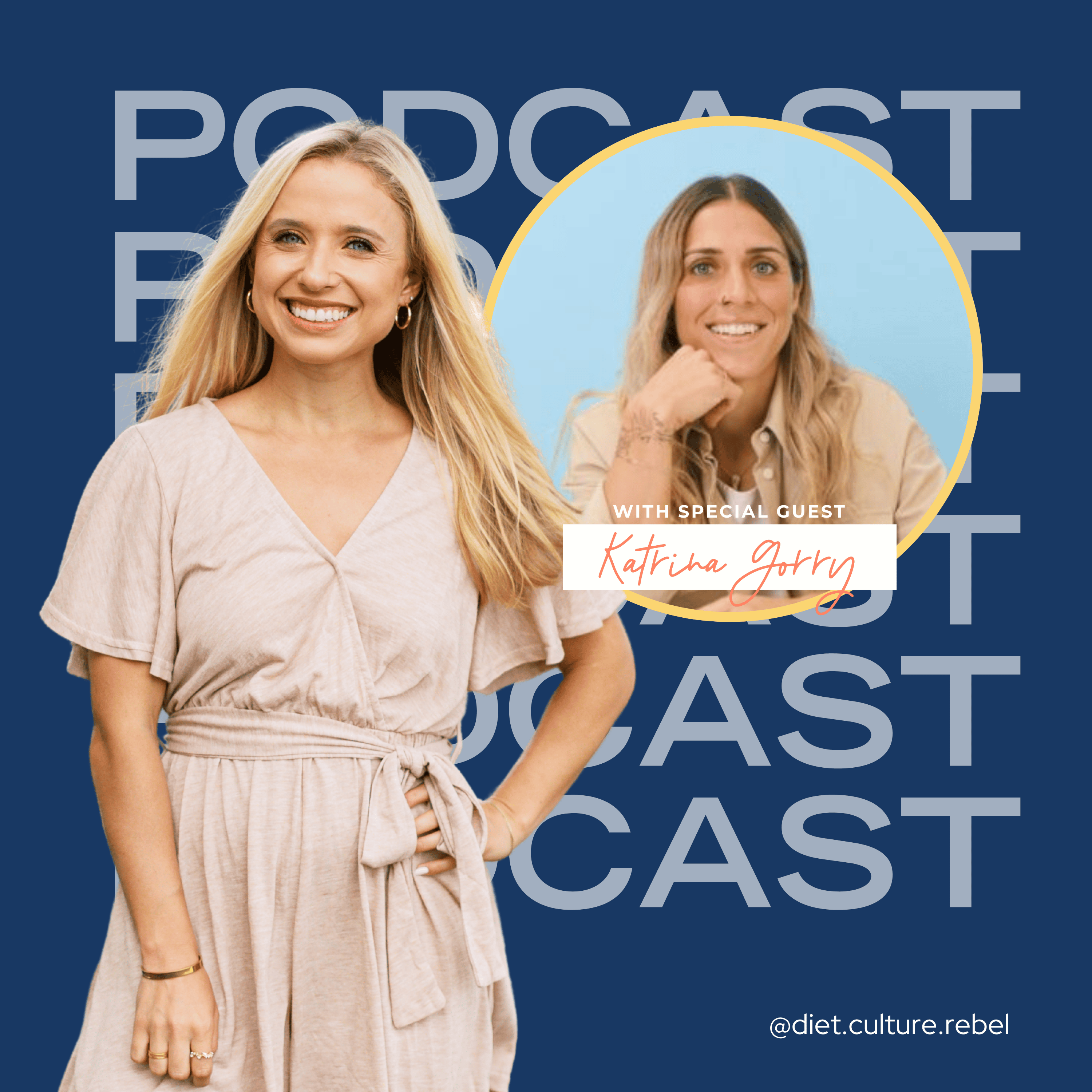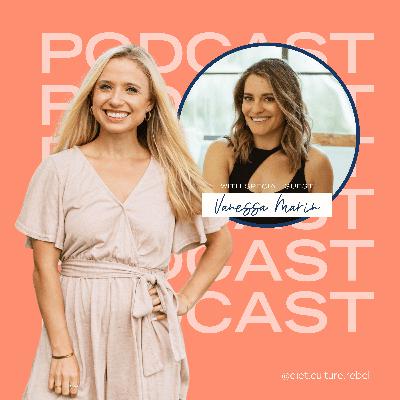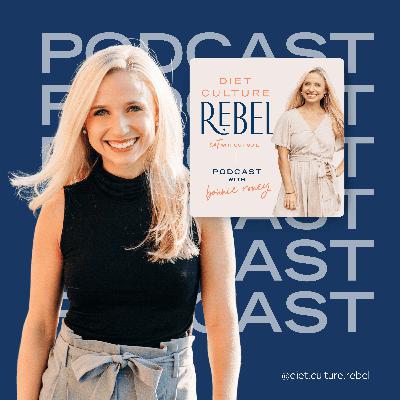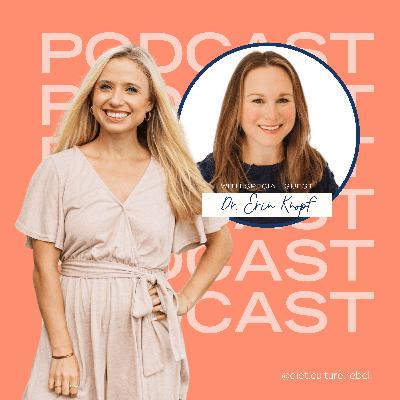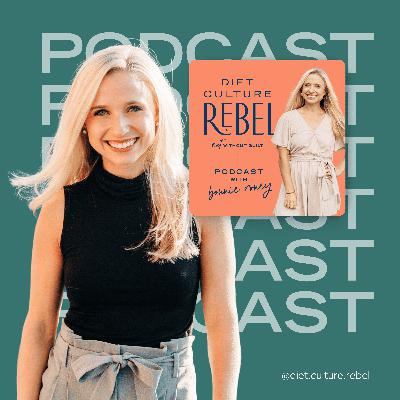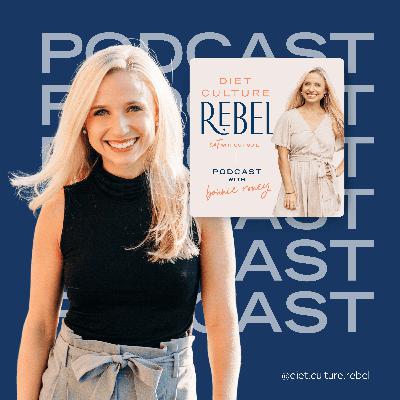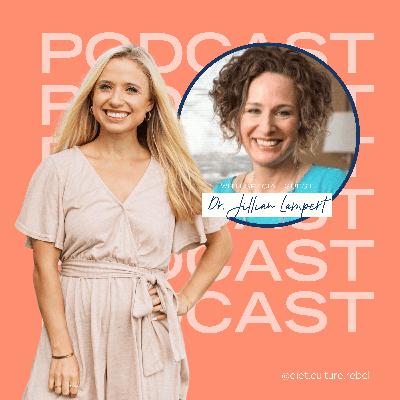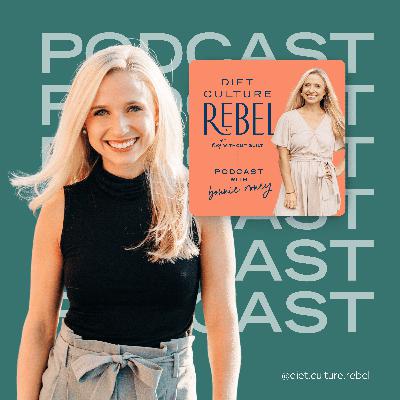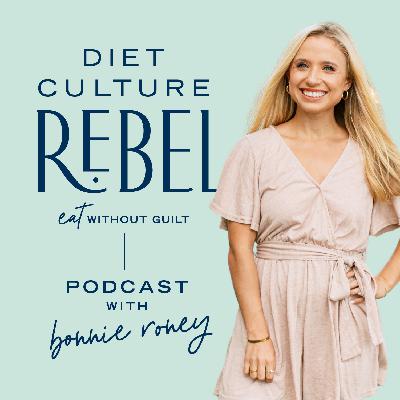Discover Diet Culture Rebel Podcast
Diet Culture Rebel Podcast

Diet Culture Rebel Podcast
Author: Bonnie Roney
Subscribed: 518Played: 17,948Subscribe
Share
© Diet Culture Rebel Podcast
Description
Ready to eat without guilt, support your actual health, and start giving diet culture the middle finger? You’re in the right place.
The Diet Culture Rebel podcast is your trusted space for breaking free from food rules, healing your relationship with your body, and learning how to eat without shame, stress, or obsession - while honoring your health in a way that actually feels good.
Hosted by Registered Dietitian and Certified Intuitive Eating Counselor Bonnie Roney, each episode delivers straightforward, no-BS guidance to help you ditch diets for good. Through expert interviews and solo deep dives, Bonnie brings you health-promoting, mindset-shifting insights that leave you feeling empowered - not overwhelmed.
“I’ve learned what’s happening inside my brain and body, and [Bonnie] gives incredible suggestions and insights on how to start the process of healing my relationship with food.”
- Diet Culture Rebel listener
With over 200 episodes and thousands of weekly listeners, this podcast is your permission slip to trust your body, reject diet culture, and take your power back - one episode at a time.
Subscribe now and listen every Wednesday.
👉 Connect with Bonnie on Instagram @DietCultureRebel
👉 Learn more about working with the DCR team at DietCultureRebel.com
The Diet Culture Rebel podcast is your trusted space for breaking free from food rules, healing your relationship with your body, and learning how to eat without shame, stress, or obsession - while honoring your health in a way that actually feels good.
Hosted by Registered Dietitian and Certified Intuitive Eating Counselor Bonnie Roney, each episode delivers straightforward, no-BS guidance to help you ditch diets for good. Through expert interviews and solo deep dives, Bonnie brings you health-promoting, mindset-shifting insights that leave you feeling empowered - not overwhelmed.
“I’ve learned what’s happening inside my brain and body, and [Bonnie] gives incredible suggestions and insights on how to start the process of healing my relationship with food.”
- Diet Culture Rebel listener
With over 200 episodes and thousands of weekly listeners, this podcast is your permission slip to trust your body, reject diet culture, and take your power back - one episode at a time.
Subscribe now and listen every Wednesday.
👉 Connect with Bonnie on Instagram @DietCultureRebel
👉 Learn more about working with the DCR team at DietCultureRebel.com
230 Episodes
Reverse
“You are allowed to enjoy your life. Satisfaction counts, rest is part of health, and your worth was never meant to be measured by a to-do list, a tracker, or a plate.”Are you tired of feeling like your worth is tied to how productive, disciplined, or “perfect” you are? In this conversation with Dr. Paula Freedman-Diamond, we explore how hustle culture, diet culture, and wellness culture overlap to fuel food struggles, anxiety, perfectionism, and toxic striving - and how you can begin letting go of unrealistic expectations so you can reconnect with your body, values, and joy. This episode will inspire you to slow down, question the standards you’re chasing, and start living in a way that actually feels good for you ✨✅ What You’ll LearnHow hustle culture, diet culture, and wellness culture overlap to create toxic striving & perfectionismWhy food struggles and anxiety are connected to chasing external validationWhat it looks like to step out of “do more, be more, control more” mode and build self-trustPractical ways to set boundaries that protect your time, energy & self-worthHow to move toward body trust, rest, satisfaction & values-aligned livingWhy your humanity matters more than any productivity hack or diet plan🔗 Connect with Dr. Paula Freedman-DiamondToxic Striving: Why Hustle and Wellness Culture Are Leaving Us Anxious, Stressed, and Burned Out―and How to Break FreeHumanKind Psych (Therapy for overthinkers)If you’ve ever thought, “Why is it so hard to stop eating when I’m full?” - you’re not alone. And spoiler alert: it’s not about willpower or control. It goes so much deeper than that. Grab the free Honoring Fullness Checklist right now at DietCultureRebel.com/Checklist to start building a more positive relationship with food. 💛Come back next week for another episode and connect with me over on Instagram at @diet.culture.rebel.Struggling with food, but not sure where to start?You don’t have to feel 100% ready to get support. If you're tired of obsessing over food or feeling stuck in the diet cycle, my team of Registered Dietitians is here to help. We offer one-on-one nutrition counseling—and we accept insurance! Spots are limited, so head to https://dietculturerebel.com/insurance to see if we’re covered in your state and learn how to get started.
"When we get more in touch with our hunger cues and honor them more consistently, then as a byproduct, we are able to more easily honor our fullness cues."Learning to trust your body after years of dieting and food rules can feel confusing and overwhelming. In this episode, I’m breaking down the Hunger and Fullness Scale, the mindful eating tool that can help untangle the confusion and guide you back to your own internal cues. Inspired by a flood of questions from my Rebel community, we dig into how you can use the scale to make eating less stressful and more enjoyable, and how it can be a practical step toward building lasting body trust.I share how honoring both hunger and fullness, rather than fixating on just one side, can help you move out of your head and into your body, shifting away from diet culture’s restrictive rules. And as always, I’m giving you honest guidance, practical tips, and important reminders that this journey is about progress, not perfection. Whether you’re starting to let go of calorie counting, or simply want to feel more at peace with your eating, today’s episode gives you the gentle push to try something new and the encouragement to trust yourself. What You’ll Learn:How the Hunger and Fullness Scale works and why it’s not just another external ruleWays to use the scale to create more pleasant and mindful eating experiencesWhy tuning into hunger matters just as much as fullnessPractical tips for building body trust with food after years of dietingHow interoceptive awareness can help you connect with your body’s signalsRed flags and reasons the Hunger and Fullness Scale may not be right for everyoneIf you’re ready to make eating easier, more satisfying, and kinder to your body, this episode will give you the tools to start rebuilding trust - one meal, one snack, and one check-in at a time. For more help with using the Hunger and Fullness Scale, grab my free download at dietculturerebel.com/hungerfullnessscale. If you’ve ever thought, “Why is it so hard to stop eating when I’m full?” - you’re not alone. And spoiler alert: it’s not about willpower or control. It goes so much deeper than that. Grab the free Honoring Fullness Checklist right now at DietCultureRebel.com/Checklist to start building a more positive relationship with food.Struggling with food, but not sure where to start?You don’t have to feel 100% ready to get support. If you're tired of obsessing over food or feeling stuck in the diet cycle, my team of Registered Dietitians is here to help. We offer one-on-one nutrition counseling—and we accept insurance! Spots are limited, so head to https://dietculturerebel.com/insurance to see if we’re covered in your state and learn how to get started.Come back next week for another episode and connect with me over on Instagram at @diet.culture.rebel.
“Once food noise quiets down, it doesn’t just change the way we eat. It changes the way we live.”Food struggles don't always show up as we may expect. They can sneak up on us, disguised as discipline, willpower, or our latest attempt at “being good.” But in reality, those all-consuming thoughts about what, when, and how much we eat are draining. They're like an app running in the background, sapping our energy and joy each day. In this episode, I sit down with Kim, a past client who spent decades tangled in food noise, emotional eating, and hidden food rules she didn’t realize existed.Kim opens up about the reality of secret eating, binge cycles, and the mental toll of battling cravings. Her story is vulnerable, honest, and incredibly relatable. Kim shares what it was like to numb out around food, the shift from excitement to guilt after eating, and how food secretly dictated her self-care, identity, and social life. But things changed, and Kim’s journey will show you how healing your relationship with food is not only possible, but transformative.Together, we explore how intuitive eating moved Kim away from relying on willpower and food rules, toward genuine self-compassion, body reconnection, and emotional growth. Whether you’re used to white knuckling through cravings or hiding evidence of what you ate, Kim’s personal wins, tips, and breakthroughs will give you a clearer lens for spotting sneaky food rules and freeing up mental space so that you can enjoy food on your terms.What You’ll Learn:How to spot sneaky food rules and food noise draining your mental energyPractical ways to honor fullness without relying on willpowerWhy emotional eating isn’t about discipline—and how dieting makes it harderThe power of self-compassion and how it decreases shame and food guiltA simple plan for coping with emotions that doesn’t hinge on food rulesHow healing your relationship with food can expand self-care, compassion, and everyday joyKim’s story is full of hope, real-life strategies, and a reminder that change is possible - even after years of struggle. I’m so grateful to Kim for sharing her journey, and I know her insights will help you quiet your own food noise and build a peaceful relationship with food.If you’ve ever thought, “Why is it so hard to stop eating when I’m full?” - you’re not alone. And spoiler alert: it’s not about willpower or control. It goes so much deeper than that. Grab the free Honoring Fullness Checklist right now at DietCultureRebel.com/Checklist to start building a more positive relationship with food.Struggling with food, but not sure where to start?You don’t have to feel 100% ready to get support. If you're tired of obsessing over food or feeling stuck in the diet cycle, my team of Registered Dietitians is here to help. We offer one-on-one nutrition counseling—and we accept insurance! Spots are limited, so head to https://dietculturerebel.com/insurance to see if we’re covered in your state and learn how to get started.Come back next week for another episode and connect with me over on Instagram at @diet.culture.rebel.
"I hear from people every single day about how they've been harmed physically and emotionally by things that influencers and content creators online have sold to them."You’ve probably noticed diet trends come and go, from raw vegan frugivore diets to the current protein obsession, but what’s less obvious is how healing your relationship with food changes more than just how you eat. It shifts how you feel, how you relate to others, and even how you view your past. In my conversation with Registered Dietitian and content creator, Abbey Sharp, we dig deep into the messy middle of food healing: from the anger and blame many of us experience at the start, to the compassion and empathy that grows with time.We look back on diet trends that might make you say, “Wait, did we really do that?” - like viral fruit-only diets and food combining rules. Abbey shares her journey combating misinformation online, the harm caused by extreme influencers, and how relentless trends keep fueling confusion and frustration. Together, we talk about the power of not rushing healing and why allowing yourself to feel and reflect can eventually make empathy come easily and naturally.From what it’s like to be on the receiving end of body comments, to how embracing a balanced, non-extreme way of eating is truly health-promoting, this episode reminds us that while diet culture is loud, you are not alone in your healing. Whether you’re in the thick of it or starting to feel things shift, there is hope for a more peaceful, intuitive relationship with food.What You’ll Learn:What it looks like to move from anger and resentment to compassion and empathy in your food healing journeyHow diet culture trends from the early 2010s to today’s “SkinnyTok” cause real harm, especially onlineWhy quick fixes and extreme approaches are not sustainable, and what truly promotes lasting healthHow Abbey handled body comments during a challenging season, and her advice for setting boundariesWhat “fake it till you make it” means when it comes to practicing food freedom and body neutralityThe biggest nutrition myths still floating around online (and which one Abbey would love to erase forever!)Whether you feel stuck or frustrated in your journey, I promise you are not alone in questioning diet culture. I’m so grateful Abbey shared the science, her sass, and her vulnerable real-life stories on the show.Abbey's Resources:TikTokInstagramYouTubePodcast: Bite Back with Abbey SharpGrab the free Honoring Fullness Checklist at DietCultureRebel.com/Checklist to start building a more positive relationship with food.Come back next week for another episode and connect with me over on Instagram at @diet.culture.rebelStruggling with food, but not sure where to start?You don’t have to feel 100% ready to get support. If you're tired of obsessing over food or feeling stuck in the diet cycle, my team of Registered Dietitians is here to help. We offer one-on-one nutrition counseling—and we accept insurance! Spots are limited, so head to
"Intuitive eating is not about perfectly staying within a calorie number or a maintenance threshold. It is about developing trust with your body and using each eating experience as feedback, not a test of whether you pass or fail."Have you ever felt like you just can’t stop eating certain foods, even when you’re full? Or maybe you find yourself second-guessing every food choice, worried you’re eating too much as you try to follow intuitive eating? These everyday struggles can leave you feeling stuck in guilt, confusion, and chaos around food.In this solo episode, I’m answering real and vulnerable questions Rebels sent me on Instagram. These are questions I hear all the time as a Registered Dietitian and Certified Intuitive Eating Counselor. From why we overeat “delicious” food, to how to handle food indecision and what it means to “eat too many calories” as an intuitive eater, I’m breaking down myths, normalizing the messiness, and offering practical, compassion-filled tools to help you trust your body again.You’ll also hear a relatable story from fellow Rebel, Jaimie, who went from tracking every calorie and overeating while on vacation to truly enjoying food and stopping when full. Together, we’ll look at the patterns that keep so many of us stuck, the real reasons eating can feel chaotic, and why permission, structure, and kindness are game-changers on your intuitive eating journey.What You’ll Learn:Why honoring fullness isn’t about willpower and what’s really behind that “can’t stop eating” feelingHow food rules and restriction actually make overeating more likely, and what to do about itPractical tools for navigating indecision and food guilt so eating can feel less chaoticThe mindset shifts that help you move away from perfectionism with food and listen to your body’s unique needsWhy occasional overeating is normal (even for intuitive eaters) and how every eating experience is an opportunity to learnHow to zoom out and look at the big picture of health, beyond any single meal or calorie countRemember, Rebels - this work isn’t about getting every food choice perfect. It’s about showing up with curiosity, compassion, and a willingness to trust your body one step at a time. Thank you for being part of this community and letting me support you in finding more peace with food. Come back next week for another episode and connect with me over on Instagram at @diet.culture.rebel.Resources:Grab the free Honoring Fullness Checklist at DietCultureRebel.com/Checklist to start building a more positive relationship with food.View the 5 Social Determinants of HealthStruggling with food, but not sure where to start?You don’t have to feel 100% ready to get support. If you're tired of obsessing over food or feeling stuck in the diet cycle, my team of Registered Dietitians is here to help. We offer one-on-one nutrition counseling—and we accept insurance! Spots are limited, so head to https://dietculturerebel.com/insurance to see if we’re covered in your state and learn how to get started.
"Trainings started to become much harder because I would restrict myself so much. Then the next day, maybe I'd binge a lot, so then I wouldn't eat for a couple days. It all was falling apart in front of my eyes, but I just didn't really know how to get out of it."Behind every sports headline, there’s a story about body image, food, and the unseen pressures athletes face. In this episode, I sit down with Katrina Gorry, professional footballer, West Ham United Women’s captain, and proud mom of two. Katrina opens up about how sport shaped her relationship with food and her body, from the thrill of being the only girl on the pitch to the darker moments of restrictive eating and the long, winding road toward healing.Katrina gets real about the toll of weigh-ins, body scans, and a culture that glorifies hyper-vigilance over food, describing how these “healthy” habits quietly spiraled into something more harmful. We talk about how food became her way to find control during a deeply vulnerable time, what finally made her realize she needed support, and how injury and isolation only deepened the struggle. You’ll hear how years of unspoken food struggles slowly gave way to honest conversations, self-compassion, and ultimately, the transformation she experienced through pregnancy and motherhood.Whether you’re an athlete, a sports fan, or someone who’s ever found themselves stuck in a cycle of food rules and body shame, Katrina’s courage will resonate. We dig deep into why so many food struggles in sport go unnoticed and why sharing these stories - out loud, in community - matters so much.What You’ll Learn:The hidden connection between disordered eating, eating disorders, and the world of sportWhy behaviors like tracking food and obsessing over body metrics are so easily mistaken for “healthy” in athletic settingsHow pressure from coaches, weigh-ins, and team culture can fuel food and body image strugglesWhy recognizing you’re struggling with food is often the first, and hardest, step toward changeWhat the realities of long-term recovery from disordered eating actually look like, both on and off the fieldHow motherhood and pregnancy reshaped Katrina’s relationship with her body and inspired a more compassionate approach to foodThank you so much for listening and for helping create a space where these conversations can spark real change. If Katrina’s story struck a chord, please share this episode with someone who needs it. Make sure to leave a rating and review to help more rebels find their way here, because we all deserve peace and freedom around food.Resources:Katrina Gorry: A Matildas hero's story of football, motherhood and breaking down barriersButterfly Foundation: Support for Eating DisordersKatrina's InstagramGrab the free Honoring Fullness Checklist at DietCultureRebel.com/Checklist to start building a more positive relationship with food.Struggling with food, but not sure where to start?You don’t have to feel 100% ready to get support. If you're tired of obsessing over food or feeling stuck in the diet cycle, my team of Registered Dietitians is here to help. We offer one-on-one nutrition counseling—and we accept insurance! Spots are limited, so head to https://dietculturerebel.com/insurance to see if we’re...
"If you treat your body poorly outside of the bedroom, it's not like you pass through the doorway into your bedroom and all of a sudden you're super tuned into your body and confident."This week, we’re diving into a topic that’s often pushed into the shadows but deeply impacts our well-being: sex. I sat down with Vanessa Marin, a licensed sex therapist, to talk about how the cultural scripts we’ve grown up with shrink women, disconnect us from our bodies, and rob us of joy, in and out of the bedroom. Just like the food rules diet culture imposes, these messages around sex convince us we’re the problem when things don’t feel right, when in reality the system is broken, not us.If you’ve ever felt embarrassed, awkward, or ashamed talking about sex (or avoided the conversation entirely), you’re not alone. Vanessa and I discuss how body image struggles show up in the bedroom, why pleasure is truly an act of rebellion, and simple, shame-free steps you can start taking to reconnect with your body and advocate for your own needs. Whether you’re single or in a relationship, there are actionable takeaways to help you create a more enjoyable and empowered sex life.I know it can be hard to open up about these topics, but the more we have these conversations, the less alone we feel, and the more power we have to create real change. Just like becoming an intuitive eater or ditching diet culture, prioritizing your pleasure is about reclaiming your own narrative and choosing freedom. What You’ll Learn: Why so many of us struggle to talk about sex, and why it’s NOT your fault How cultural scripts teach women to shrink, disconnect from their bodies, and put others’ needs first The surprising ways body image struggles show up in the bedroomHow tuning into pleasure in small, everyday ways can heal your relationship with your bodyFive conversations to have with your partner that will transform your love lifeWhy embracing pleasure is a true act of rebellion (and how collective sisterhood can make advocacy feel less overwhelming)I hope this conversation sparks a little rebellion in you, wherever you are on your journey. Remember: there is absolutely nothing wrong with you, whether we’re talking about food, your body, or your sex life. Permission granted to claim your pleasure, advocate for your needs, and break free from shame. If this episode resonated with you, share it with a friend, leave a review, and let’s keep spreading this message of empowerment.Vanessa’s Resources:WebsiteInstagram: @vanessaandxanderTikTokPodcastBook and Card DeckCome back next week for another episode and connect with me over on Instagram at @diet.culture.rebel.Struggling with food, but not sure where to start?You don’t have to feel 100% ready to get support. If you're tired of obsessing over food or feeling stuck in the diet cycle, my team of Registered Dietitians is here to help. We offer one-on-one nutrition counseling—and we accept insurance! Spots are limited, so head to https://dietculturerebel.com/insurance to see if we’re covered in your state and learn how to get started.
“I really felt like alcohol was the one thing that was keeping me from being the person that I wanted to be."If you’ve ever wondered how alcohol might be impacting your ability to show up fully in your life, or if you’re just curious about making any change that feels a little scary, this episode is for you. I sat down with Sumner Brooks, a registered dietitian, mom, and author of How to Raise an Intuitive Eater, who bravely shares her story of quitting alcohol and how it changed everything from her mental health to her parenting and beyond.While we usually focus on food and body image on Diet Culture Rebel, today we zoom out to explore what it means to get curious about anything that might be getting in the way of living your fullest, most connected life. Sumner opens up about what finally made sobriety "stick” for her after years of trying, how vulnerability paved the way for real change, and the actual joy and presence she discovered in sobriety.We also talk about how ingrained alcohol is in our daily lives and our culture, what it looks like to navigate those familiar “Why aren’t you drinking?” comments, and where food and alcohol are similar (and importantly, different) when it comes to compulsion, habituation, and addiction. Sumner’s story is a powerful reminder that even if everything looks fine on the outside, you’re allowed to want more peace and presence on the inside.No matter what you’re working on - food, alcohol, or something entirely different - I invite you to go into this episode with curiosity and self-compassion. Sometimes, you don’t even know when you need to hear something until you do.What You’ll Learn:How Sumner realized alcohol was keeping her from showing up in the life she worked so hard to buildThe role of vulnerability and community storytelling in making big life changesWhy “mommy wine culture” is so normalized, and how that intersects with diet culture’s mixed messages about food and alcoholHow reading other women’s stories helped Sumner finally quit drinking for goodHow sobriety changed Sumner’s relationship with herself, her parenting, and her ability to be fully presentThe real differences between intuitive eating and “intuitive drinking”, and why abstinence from alcohol is not the same as cutting out foodsThank you so much to Sumner for sharing her truth so openly and authentically. If this episode sparked anything for you about drinking, food, parenting, or just wanting more presence in your life, hold onto that curiosity and let it guide your next step, even if it’s small.Check out Sumner's book, How to Raise an Intuitive Eater: Raising the Next Generation with Food and Body Confidence.Come back next week for another episode and connect with me over on Instagram at @diet.culture.rebel.Struggling with food, but not sure where to start?You don’t have to feel 100% ready to get support. If you're tired of obsessing over food or feeling stuck in the diet cycle, my team of Registered Dietitians is here to help. We offer one-on-one nutrition counseling—and we accept insurance! Spots are limited, so head to https://dietculturerebel.com/insurance to see if we’re covered in your state and learn how to get started.
“It makes me wonder, what things happening today will we look back on years from now with similar eyes and say, 'I can’t believe we let this happen?'”If you ever watched The Biggest Loser and found yourself rooting for the contestants (and maybe even feeling inspired), this episode will prompt you to look at it all through a very different lens. Today’s conversation is not just about a reality TV show, but about exposing the extreme and unsafe practices it normalized, the harmful beliefs it perpetuated about health and body size, and how so many of those beliefs are still shaping our lives today.I'm breaking down the new Netflix documentary, Fit for TV, and sharing my reflections as a former viewer, a registered dietitian, and someone who now sees just how toxic shows like The Biggest Loser have been for our collective understanding of health. From unrealistic exercise routines to extreme calorie restriction, public humiliation, and the perpetuation of weight stigma, these harmful narratives stuck with me for years.We dig into the consequences contestants faced, including metabolic slowdown, weight regain, and lifelong shame, and we shine a light on why the system set us all up to fail. My hope is that after listening, you’ll deepen your understanding of why dieting fails us, how weight stigma sneaks into everyday life, and what it really looks like to pursue health with compassion instead of shame.Most importantly, we talk about what you can do to unlearn these narratives and break the cycle for yourself and for those around you. Whether you watched The Biggest Loser or not, this episode will help you see diet culture with a more critical, informed, and compassionate lens.What You’ll Learn:Why the practices on The Biggest Loser were incredibly unsafe, and why they were normalized for entertainmentThe reality of metabolic adaptation, weight regain, and the toll of weight cycling on our healthThe importance of challenging harmful narratives and stepping away from self-blame when diets don’t “work”How weight stigma shows up in sneaky waysWhat it looks like to move forward with a healthier, more compassionate view of all bodies (including yours!)You are not failing if a diet hasn’t worked for you. The system is flawed, not you. Thank you for listening and for being willing to look a little more deeply and compassionately at what we’ve been taught about health. If this episode resonated, I’d love for you to leave a rating and review, or share it with someone who might need to hear it too!Resources:What We Don't Talk About When We Talk About Fat, by Aubrey Gordon"You Just Need to Lose Weight" and 19 Other Myths About Fat People, by Aubrey GordonCome back next week for another episode and connect with me over on Instagram at @diet.culture.rebelStruggling with food, but not sure where to start?You don’t have to feel 100% ready to get support. If you're tired of obsessing over food or feeling stuck in the diet cycle, my team of Registered Dietitians is here to help. We offer one-on-one nutrition counseling—and we accept insurance! Spots are limited, so head to https://dietculturerebel.com/insurance to see if we’re covered in your state and learn how to get started.
”The last thing we ever want to do to a child’s body is shrink it. If we make a child’s body a lower weight, it completely derails their development, their internal signaling, interrupts their physical and cognitive growth - all of it.”If you’re a parent or if you ever were a kid in a world obsessed with BMI and weight, this episode is a must-listen. I sat down with Dr. Erin Knopf, who is not only a board-certified pediatrician and psychiatrist, but also an eating disorder specialist who’s boldly calling out the harmful ways our medical system talks about weight, especially when it comes to kids. If you’ve ever left a pediatrician’s office feeling uneasy about body or food advice or if you’re working on healing your own inner child, there is so much wisdom for you here.We dig deep into the real dangers of focusing on weight in childhood, why trying to shrink a child’s body does more harm than good, and how growth charts and BMI are often misused and misunderstood. Dr. Knopf shares heartbreaking examples, and evidence-based reasons why praise for things like wedding-dress size decades later is not only unhelpful, but actively harmful. She brings science, context, and genuine compassion to this conversation.Even if you don’t have kids, this one’s for you. We were all once children shaped by these messages, and many of us are still unpacking them. Whether you’re worried about passing these beliefs on or realizing you internalized them long ago, let this episode be an invitation to unlearn and start fresh, for yourself and the next generation. What You’ll Learn: Why shrinking a child’s body is never the answer, and what the real developmental risks are How weight stigma shows up both physically and psychologicallyThe truth about growth charts and BMI - what most parents (and many doctors!) don’t know Why “health” can’t be measured by weight alone for kids, teens, or adults How to talk about food and bodies at home to break the cycle and foster genuine well-being What to do if you’re realizing you’ve accidentally passed on unhelpful messages to your childrenIf this episode brought up feelings for you, know that’s okay, and that awareness is a gift. You are not a bad parent or a bad person for having learned these ideas, and you’re absolutely capable of creating positive change, starting today. By healing your own relationship with food and your body, you’re also helping build a compassionate foundation for those you love.Was today's episode helpful for you? If so, I know you'll also love my past conversation with Dr. Maggie Landes, where we dive even deeper into weight stigma in the healthcare system.Connect with Dr. Erin Knopf:Instagram: @virtual.eating.recovery4uInstagram: @drerinknopfLinkedInYouTubeVery HealthCome back next week for another episode and connect with me over on Instagram at @diet.culture.rebelStruggling with food, but not sure where to start?You don’t have to feel 100% ready to get support. If you're tired of obsessing
"I believe the fear around Seed Oils feeds into the idea that we have complete control over our health outcomes and that eating perfectly will guarantee better health. This is far from the truth..."Are Seed Oils really the enemy or is this another story from diet culture? In this episode, we're diving into the truth about seed oils. We're covering what they are, what the research actually says, and why the fear around them is often rooted in diet culture, privilege, not health.I'm excited to share the facts with you on this episode so you can feel calmer and more confident in your food choices. This episode isn't about giving you rules or telling you to track what kind of oils are in every single thing that you eat. It is about equipping you with knowledge so that you can challenge misinformation that might otherwise leave you feeling anxious, guilty, or obsessing over food.If learning about nutrition still feels overwhelming or distressing, that's okay. You don't have to force yourself through this episode if it's not what you need right now. Take care of yourself and come back when it feels approachable. When you are ready, I'd much rather you learn about seed oils here in a space that prioritizes your relationship with food rather than from a diet culture source that doesn't.What You’ll Learn:What Seed Oils are and why they are used so widelyThe main arguments behind the anti-Seed Oil movementWhy it's often NOT a good idea to focus on eliminating Seed Oils What to focus on besides eliminating Seed Oils, especially if you want to prioritize your relationship with foodHow to challenge nutrition misinformation onlineWhy the fear around Seed Oils is often rooted in classism and wellness elitism, not health Thanks for being here! I'd love to hear what you think about Seed Oils after listening to this episode. Does avoiding Seed Oils make sense to your overall health, budget, or relationship with food? Let me know over on Instagram at @diet.culture.rebelStruggling with food, but not sure where to start?You don’t have to feel 100% ready to get support. If you're tired of obsessing over food or feeling stuck in the diet cycle, my team of Registered Dietitians is here to help. We offer one-on-one nutrition counseling—and we accept insurance! Spots are limited, so head to https://dietculturerebel.com/insurance to see if we’re covered in your state and learn how to get started.
"I would cry almost every day because of how hungry I was, but I didn't have enough macros to eat what I needed."If you've been tracking macros, calories, or points, and you are starting to feel like it's taking over your life, this episode is for you. And even if you don't track, but find yourself thinking about food constantly or that you're failing when you're not following a food plan perfectly, this conversation will resonate.In this episode we get to hear from Jaimie, a fellow Rebel, who has experienced a 180 in her relationship with food after years of obsessing over numbers. Jaimie shares how food feels less loud now and how she's back to doing things she loves and food no longer dictates her mood, her day, or her self worth.My conversation with Jaimie paints a clear picture of how something that seems harmless like tracking macros can slowly chip away at your joy, your body trust, and your relationship with food. BUT Jaimie's story also shows what food freedom looks like on the other side!What You’ll Learn:How Diet Culture conditions us to ignore our body cues and dismiss our feelings of dieting overwhelmWhy we keep dieting even when we know it isn't healthyHow to shift away from food guilt and move away from trackingWhat Jaimie has done to stay grounded and not return to her old habitsWhat the journey to food freedom has looked like for Jaimie (and why it's possible for you too!)If you are tired of thinking about food all the time, Jaimie's story will give you hope that a more peaceful and intuitive relationship with food is possible.Thank you to Jaimie for sharing so vulnerably so others may be able to break away from tracking and experience food freedom like she has.Struggling with food, but not sure where to start?You don’t have to feel 100% ready to get support. If you're tired of obsessing over food or feeling stuck in the diet cycle, my team of Registered Dietitians is here to help. We offer one-on-one nutrition counseling—and we accept insurance! Spots are limited, so head to https://dietculturerebel.com/insurance to see if we’re covered in your state and learn how to get started.Come back next week for another episode and connect with me over on Instagram at @diet.culture.rebel
"The craze of fat-free foods was partnered with the strongest message that you can be bad and still be good."If you've ever felt confused by all of the changing food trends or wondered why something that seemed healthy a few years ago is suddenly frowned upon now, this episode will give you so much clarity. You are going to learn how diet culture has evolved over the decades and walk away feeling more grounded the next time a new trend comes around.Today I'm joined by Dr. Jillian Lampert, who is the Vice President of Strategy and Public Affairs for Accanto Health, and she's done incredible work in advocacy, education, and care access over the last 30 years.Dr. Jillian first became a dietitian during the Fen-Phen era and has seen diet culture evolve firsthand. As someone with lived experience of an eating disorder herself, she brings so much compassion and insight to this conversation and to the work she does each day.What You’ll Learn:The wild, ever-changing landscape of diet culture and weight loss trends, How to spot diet culture as it continues to evolve,How some of the craze behind GLP-1s feels similar to to Fen-Phen in the 90's,Why diet foods can act like a permission slip to overeat and pull us away from body attunement,How dietary fat plays an important role in satisfaction and fullness, andThe alarming statistic connecting dieting and eating disordersThanks for being here today! Let me know what takeaways you have from this episode over on Instagram @diet.culture.rebelConnect with Dr. Jillian Lampert through the Emily Program at EmilyProgram.comStruggling with food, but not sure where to start?You don’t have to feel 100% ready to get support. If you're tired of obsessing over food or feeling stuck in the diet cycle, my team of Registered Dietitians is here to help. We offer one-on-one nutrition counseling—and we accept insurance! Spots are limited, so head to https://dietculturerebel.com/insurance to see if we’re covered in your state and learn how to get started.
" My coach said even though you're running a lot, it still doesn't grant you the right to eat whatever you want..."If you've ever felt guilt when resting, struggled to motivate yourself to move, or felt stuck in an all-or-nothing mindset with exercise, this episode is for you!In this episode I'm sharing my personal journey with exercise in hopes to help you reflect on your own so you can walk away with clear ideas to transform your relationship with movement for the better.I'm covering everything from how exercise first became a way to control my body, to how that evolved over the years, and what ultimately helped me shift towards freedom, joy, and body attunement.What You’ll Learn:The role unhelpful comments played in my relationship with exerciseWhy unsaid pressures to look a certain way drove my worst habitsHow hustle culture and diet culture fueled my overexercisingThe science behind why overexercising can be such a hard habit to quitPLUS the small but meaningful signs of progress I experienced along the wayThere were so many points in my journey where I thought everything I was doing was healthy. I thought I was doing the right things but looking back now I can see clear signs that I was struggling. My hope is that this episode will help you reflect on your relationship with exercise and connect the dots to identify what shifts you need to make to create a more peaceful, sustainable relationship with exercise.Thanks for being here! Let me know what takeaways you have from this episode over on Instagram @diet.culture.rebelI'd love to hear what comes from reflecting on your own relationship with exercise. If you enjoyed this episode, check out episode 201 with Personal Trainer Michael Ulloa!Struggling with food, but not sure where to start?You don’t have to feel 100% ready to get support. If you're tired of obsessing over food or feeling stuck in the diet cycle, my team of Registered Dietitians is here to help. We offer one-on-one nutrition counseling—and we accept insurance! Spots are limited, so head to https://dietculturerebel.com/insurance to see if we’re covered in your state and learn how to get started.
"It's not that you're lacking willpower or that you're weak or lazy... every cell in your body is probably screaming that you need to eat these carbs or you're going to die."If you have PCOS (Polycystic Ovary Syndrome) or another medical condition and ever wondered if Intuitive Eating would still benefit you, this episode is for you! Julie Duffy Dillon and I dive into the complexities of PCOS and the role diet culture and weight stigma play in its care.Even if you don't have PCOS, you won't want to miss this chat with Julie Duffy Dillon!What You’ll Learn:How a healthy relationship with food helps in managing medical conditionsWhy there is a higher risk of disordered eating among people with PCOSWhat Diet Culture gets wrong about people with PCOSHow to manage insulin resistance with Intuitive EatingWhy you should consider shift from a mindset of restriction to a mindset of additionPLUS what supplements Julie recommends over and over againThanks for being here! Let us know what you learned from this episode over on Instagram @diet.culture.rebelConnect with Julie Duffy Dillon:Website: JulieDuffyDillon.com/pcosPodcast: Find Your Food VoiceBook: JulieDuffyDillon.com/bookStruggling with food, but not sure where to start?You don’t have to feel 100% ready to get support. If you're tired of obsessing over food or feeling stuck in the diet cycle, my team of Registered Dietitians is here to help. We offer one-on-one nutrition counseling—and we accept insurance! Spots are limited, so head to https://dietculturerebel.com/insurance to see if we’re covered in your state and learn how to get started.
In this episode, registered dietitian and certified intuitive eating counselor Bonnie Roney shares three powerful tips to help you honor your fullness without guilt, food rules, or restriction.You’ll learn why it’s not about willpower or discipline, and what’s really going on beneath the surface when fullness feels hard to recognize or act on. From sneaky restriction to the Clean Plate Club to food satisfaction, this episode offers a compassionate, evidence based approach to reconnecting with your body and building real trust around food.Discussed in this episode:Why traditional “just stop when you’re full” advice falls shortHow dieting and food rules disrupt your hunger and fullness cuesThe surprising role of satisfaction in helping you stop eatingHow to start rebuilding body trust with intentional, not restrictive, structureWhat common barriers might be getting in your way (and how to move past them)Real-life client stories that show this work actually worksStruggling with food, but not sure where to start?You don’t have to feel 100% ready to get support. If you're tired of obsessing over food or feeling stuck in the diet cycle, my team of Registered Dietitians is here to help. We offer one-on-one nutrition counseling—and we accept insurance! Spots are limited, so head to https://dietculturerebel.com/insurance to see if we’re covered in your state and learn how to get started.Connect with Bonnie on Instagram: @diet.culture.rebel
In this episode, Bonnie shares why she’s stepping away for the week and what it really means to rest in a world obsessed with hustle and diet culture. From overworking to overexercising, she highlights how the pressure to always be productive shows up in our relationships with food and our bodies. This episode is a gentle reminder that rest is not failure, it’s a powerful form of rebellion. Enjoy the 200+ past episodes we have for support!Struggling with food, but not sure where to start?You don’t have to feel 100% ready to get support. If you're tired of obsessing over food or feeling stuck in the diet cycle, my team of Registered Dietitians is here to help. We offer one-on-one nutrition counseling—and we accept insurance! Spots are limited, so head to https://dietculturerebel.com/insurance to see if we’re covered in your state and learn how to get started.Connect with Bonnie on Instagram: @diet.culture.rebel
In this episode, Bonnie is joined by Dr. Blair Burnette, an eating disorder researcher and assistant professor at Michigan State University to set the record straight on what intuitive eating really is. Together, they explore how harmful diet culture myths persist, why so much eating disorder research is biased, and what science says about intuitive eating and health. This honest, evidence-based conversation offers validation and clarity for anyone who’s ever felt confused, frustrated, or judged about how they eat or what they believe about their body.What You’ll Learn:What intuitive eating is actually about (and what it’s not)The psychological and emerging physical health benefits linked to intuitive eatingHow diet culture has shaped eating disorders and disordered eating behaviorsWhy so much existing research on eating disorders is limited and biasedThe concept of interoceptive awareness and why it matters for healing your relationship with foodHow structured eating can still align with intuitive eatingWhy centering weight in healthcare does more harm than goodHow personal and systemic change around food and body image beginsConnect with Dr. Blair:Website: https://ariselabmsu.com/Instagram: https://www.instagram.com/ariselabmsuStruggling with food, but not sure where to start?You don’t have to feel 100% ready to get support. If you're tired of obsessing over food or feeling stuck in the diet cycle, my team of Registered Dietitians is here to help. We offer one-on-one nutrition counseling—and we accept insurance! Spots are limited, so head to https://dietculturerebel.com/insurance to see if we’re covered in your state and learn how to get started.Connect with Bonnie on Instagram: @diet.culture.rebel
In this episode, Registered Dietitian and Certified Intuitive Eating Counselor Bonnie Roney is joined by and trauma-informed non-diet nutrition therapist Tracy Brown for a powerful conversation about the mental and emotional roots of food struggles. Tracy explains how early experiences shape our neural pathways around food, why chronic dieting is an adaptation to stress, and how trauma (both big and small) can disconnect us from our body's natural hunger and fullness cues. This episode goes beyond food rules to explore the deeper meaning behind our eating patterns and offers compassionate tools for healing.Questions Answered In This Episode:How do childhood experiences shape our adult relationship with food?What's the connection between trauma and eating disorders or chronic dieting?Why do diets feel like they provide safety and control?How does chronic stress affect digestion and hunger signals?What does it mean when someone says "I feel fat"?Where do I start if I'm feeling overwhelmed by my food struggles?How can I build foundational eating skills while healing?Why is support so important in recovery from disordered eating patterns?Struggling with food, but not sure where to start?You don’t have to feel 100% ready to get support. If you're tired of obsessing over food or feeling stuck in the diet cycle, my team of Registered Dietitians is here to help. We offer one-on-one nutrition counseling—and we accept insurance! Spots are limited, so head to https://dietculturerebel.com/insurance to see if we’re covered in your state and learn how to get started.Connect with Bonnie on Instagram: @diet.culture.rebel
In this informative and compassionate episode, Bonnie breaks down the rising popularity of GLP-1 medications (like Ozempic, Wegovy, and Mounjaro) specifically as they relate to weight loss. She dives deep into how they work, why they’re being so widely prescribed, what the research actually says, and the often-overlooked risks and implications, especially around nutrition, food noise, and long-term health. Whether you’re considering a GLP-1, currently on one, or feeling confused and conflicted, this episode offers grounded insights, body autonomy, and a non-judgmental space for informed decision-making.In this episode, you’ll learn:How GLP-1 medications work to suppress appetite and delay stomach emptyingThe key difference in dosing between diabetes management and weight loss useWhy weight regain is common after stopping these medicationsThe connection between GLP-1 use, food noise, and eating disordersWhy prioritizing nutrition is critical—especially if you’re using a GLP-1What this movement gets right—and what it missesRisks, side effects, and long-term unknowns of GLP-1 useHow to do a personal risk-benefit analysis rooted in body autonomyQuestions answered in this episode:What are GLP-1 medications, and why are they being used for weight loss?How do these drugs affect hunger, fullness, and food thoughts?Are there side effects or long-term risks with using GLP-1s for weight loss?What does the research actually say about their effectiveness and safety?Can these meds be harmful for someone with a history of disordered eating?What should I consider if I’m thinking about starting (or stopping) a GLP-1?How can I support a friend or loved one who is on one of these medications?Mentioned in this episode:Listen to episode 173: Quiet The Food Noise: 3 Ways Intuitive Eating Can HelpGLP-1 Informed Consent from Medical Students for Size Inclusivity DownloadFollow Regan Chastain's work: https://weightandhealthcare.substack.com/ Struggling with food, but not sure where to start?You don’t have to feel 100% ready to get support. If you're tired of obsessing over food or feeling stuck in the diet cycle, my team of Registered Dietitians is here to help. We offer one-on-one nutrition counseling—and we accept insurance! Spots are limited, so head to https://dietculturerebel.com/insurance to see if we’re covered in your state and learn how to get started.Connect with Bonnie on Instagram: @diet.culture.rebel


